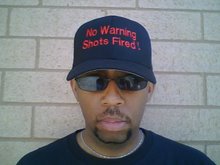Thug-o-phobia: The Real Reason We Can't Stop Gangs
Paul Scott
"In Durham they say we gang bang.
All around the world it's the same thang."
Unless we're shootin' you don't know my name
That's the only way we gain fame."
Thug-o-phobia-TRUTH Minista
Go to any major city in America and ask residents what are the major problems facing their communities and you can bet somewhere in their top 5 will be gangs; that dreaded group of young'uns who go 'round robbin' and pillagin' innocent town folks. Durham, NC is no different, as since the late 90's, the city has been portrayed in the media as the gang capital of the South. This has resulted in an epidemic of "thug-o-phobia" that has town folks seeing gangsters behind every street light post.
In some ways, Thug-o-phobia has become the new radical chic of the 60's, as there is something dangerous, yet exciting about gangsta-ism i(n a James Dean kind of way) for many suburbanites . So, any O.G. (Original Gangster) Joe who rolls into town with a tall tale about how he "was a member of the notorious, Riverdale "Archie Gang" but experienced an epiphany on his way to Pop's Drive Inn to do a drive-by on rival gang "The Jugheads" is welcomed with open arms to "save Durham's youth."
While the local guy with a workable solution based on a strong socio-economic analysis of the problem may be ignored, any out of town slickster with a henna tattoo of Bugs Bunny on his shoulder is given the key to the city.
Since the gang problem has been an issue in Durham and many southern cities for over the last decade, we must explore the many reasons why a college town bustin' at the seams with smart folks, can't seem to get a handle on the problem?
First, there has been little effort to understand the history of gangs in this country. Although most people assume that gangs started in South Central Los Angeles with the Bloods and the Crips, the truth is that gangs in American started when European immigrants organized themselves into protection societies. Later, some of these organizations became organized crime families. This is ,somewhat, similar to the origins of the modern urban street gangs, however, the Bloods and Crips did not come into national prominence until the mid to late 80's.
While poverty and lack of employment may have played a major part in the criminalization of gangs, many will agree that it was the drug trade that gave rise to violent gang activity. Some have alleged that 40 years ago heroin was purposely introduced into black neighborhoods, as well as the hippie counter culture in order to stifle activism; opening the door for the problems we are experiencing, today. Also, authors like Gary Webb, in his controversial book "Dark Alliance," traced the government's alleged role in the crack epidemic in Los Angeles during the mid 80's.
It must, also, be noted that the act of "fighting gangs" is, in and of itself, a cash cow. Many people are depending on the continuous cycle of gang violence to pay their mortgages and to send their children to college. One can only guess the money that goes towards paying "gang experts," sponsoring gang awareness seminars and maintaining the prison industrial complex.
While the role of pop culture in promoting gangsta-ism is often discussed at anti-violence workshops, most presentations only deal with surface issues that begin and end with placing the entire blame for gangs on Hip Hop music. Although such rappers as Snoop Dog (Crip) and the Game (Blood) should be held accountable for the role that they have played in the destruction of our communities, most folks are totally oblivious to the names of the rich business men who sign their paychecks. Although many people would recognize rapper, Lil Wayne (Blood affiliated), they wouldn't recognize Jimmy Iovine (Interscope, which distributed Death Row Records) or Sumner Redstone (Viacom, parent company of BET,MTV, VH1) if they bumped into them on the street.
Hollywood's role in glamorizing the gangsta lifestyle also must not be ignored. While movies like "Colors," " Boyz in the Hood" and "Menace II Society" may have sparked America's fascination with gangs, HBO's 1994 documentary , "Gang Wars: Bangin' in Little Rock" served as a major recruiting tool for gangs outside of Chicago and California.
The key to solving the gang problems is as multifaceted as the reasons for their existence. Contrary to popular belief, one size does not fit all.
Although, gang membership is not limited by color nor class, the rationale for an African American or Latino child joining a gang as opposed to a white child may be ,vastly, different. There may, also, be different reasons for a kid from the 'hood gang bangin' than a kid from the 'burbs. Unfortunately, Durham has been slow to embrace the cultural educational solutions that have been effective in larger cities for fear that they may be seen as divisive. We must listen to those voices who can address the problem from a cultural perspective.
Also, the calls for more activities for Durham's young people are often drowned out by the traditional "tough on crime" rhetoric.
City officials must make funding youth activities more than just a slogan to get votes during election time.
Lastly, the city officials, educators and religious leaders must sponsor more town hall meetings to come up with workable solutions instead of the usual "An Idiot's Guide to Gangs" type format.
If we do not come up with new and innovative solutions to the problem, 10 years from now we'll still be jammin' to the same ol' song:
"In Durham they say we gang bang...."
Min. Paul Scott is founder of the Messianic Afrikan Nation For more information contact (919) 972-8305
Sunday, November 1, 2009
Thug-o-phobia: The Real Reason we Can't Stop Gangs
Labels:
barack obama,
bloods,
crime,
crips,
duham,
election,
Eric Holder,
gangs,
gucci mane,
hiphop,
Lil wayne,
Snoop Dog

